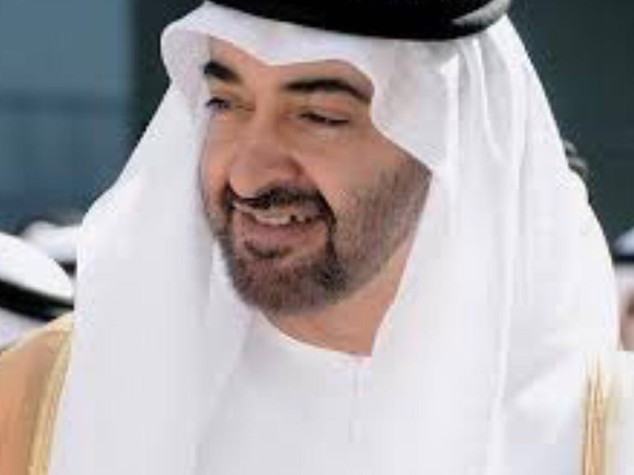Emirates-Vatican: Mohamed bin Zayed in Rome for official visit
(AGI) - Abu Dhabi, Sep 15 - His Highness Sheikh Mohamed bin Zayed Al Nahyan, Cro...

(AGI) - Abu Dhabi, Sep 15 - His Highness Sheikh Mohamed bin Zayed Al Nahyan, Crown Prince of Abu Dhabi, has arrived in Rome at the start of an official visit to the Vatican City where tomorrow he is due to meet with Pope Francis. Sheikh Mohamed and Pope Francis will discuss bilateral ties between the UAE and the Vatican and ways of developing them, as well as review joint cooperation efforts in promoting tolerance, dialogue and coexistence, values held by all religions, as part of efforts to achieve security, peace and stability in the region and the world. Mohamed also met with Italian Prime Minister, Matteo Renzi, to discuss ways of developing friendship and cooperation relations between the two countries, and a number of issues of common concern. Sheikh Mohamed is accompanied on the visit by a high-level delegation which includes Sheikh Abdullah bin Zayed Al Nahyan, Minister of Foreign Affairs and International Cooperation, Reem bint Ibrahim Al Hashemi, Minister of State for International Cooperation, Ali bin Hammad Al Shamsi, Deputy Secretary-General of the National Security Council, Khaldoon Khalifa Al Mubarak, Chairman of Abu Dhabi Executive Affairs Authority, Mohammed Mubarak Al Mazrouei, Under-Secretary at the Court of Abu Dhabi Crown Prince, and Hessa Al Otaiba, UAE Ambassador to Spain and UAE Non-Resident Ambassador to the Vatican. The Constitution of the United Arab Emirates provides for freedom of religion, and the government respects this right in practice. Although the UAE is an Islamic country, there are many places of worship that cater for followers of other religions. Most churches across the state have been built on land donated by the Rulers of the Emirates to the respective religious organisations. The US International Religious Freedom Report speaks favourably of the UAE with regard to religious freedom. In its report for 2012, the United States Department of State Bureau of Democracy, Human Rights and Labour, affirms that the constitution of the UAE guarantees "the freedom to exercise religious worship in accordance with established customs, provided that it does not conflict with public policy or violate public morals. It also stipulates that all citizens are equal before the law, without discrimination between citizens on grounds of religious belief". Although exact figures are difficult to assess due to the constant coming and going of expatriates, according to the latest estimates available Christians account for over 10 percent of the total population of the UAE, numbering approximately 900,000, of which over 250,000 are Catholics. In 2005, there were 24 churches in the UAE, today there are about 40, according to figures from the Emirati government authorities and U.S. State Department. In Dubai, the Church of the Assumption was built in 1967 by Fr. Eusebio Daveri. It was demolished in 1988 to make way for a larger church, St. Mary's, to accommodate the growing number of Catholics. The affiliated St. Mary's Catholic High School also originally opened in the 1960s. Today, it has 2,200 pupils and is affiliated to the University of London, licensed to issue Advanced Level Certificates. St. Joseph's Cathedral in Abu Dhabi was inaugurated in 1965 on a plot of land along the present Corniche, donated by H.H. Sheikh Shakbut, then Ruler of Abu Dhabi. The parish today has over 100,000 expatriate Catholics from all over the world. Masses are celebrated in several different languages and the Church is at full capacity for most services. Saint Paul's Church is a 4,560-square-metre complex in Musaffah, a fast-growing suburb of Abu Dhabi, and has been coping with a hectic schedule since opening in June, 2015. There are now 16 services at the weekend and 14 during the week. The land for the church was graciously donated by President His Highness Sheikh Khalifa bin Zayed Al Nahyan in his capacity as Ruler of Abu Dhabi, in November 2011 to cater for the spiritual needs of the large catholic community, and now estimates that it welcomes between 60,000 and 70,000 worshippers each week. On 11th June 2015, Sheikh Nahyan bin Mubarak Al Nahyan inaugurated the complex in the presence of Cardinal Pietro Parolin, Secretary of State of the Vatican, Archbishop Petar Rajic, the Apostolic Nuncio to the Arabian Peninsula, Bishop Camillo Ballin, Apostolic Vicar of Northern Arabia and Bishop Paul Hinder, the Apostolic Vicar of Southern Arabia. The United Arab Emirates has Oriental, Coptic, Russian and eastern Orthodox churches, along with those for Protestants and Roman Catholics. According to the residency law of the UAE, those who employ a non-Muslim domestic helper must allow the employee to visit his or her church or temple to worship at least once a week. In 2014, Sheikh Nahyan bin Mubarak Al Nahyan, the Minister of Culture and Knowledge Development, while attending G20 Interfaith Summit in Australia, underlined the significance of dialogue among religions and cultures, saying that the UAE encourages dialogue to build communication bridges and understanding to solve problems facing humanity as a way for co-operation to achieve happiness for all mankind, and citing the UAE as a model for religious freedom, tolerance and peaceful religious coexistence. Sheikha Lubna bint Khaled Al Qasimi is the recently-appointed Minister of State for Tolerance. In June of this year, she emphasised her commitment to providing and assisting freedom of worship for religious minorities in the UAE during a visit to the Vatican when she had a private audience with His Holiness Pope Francis, highlighting the co-existence of more than 200 nationalities in the UAE in security, peace and prosperity. (AGI) .

